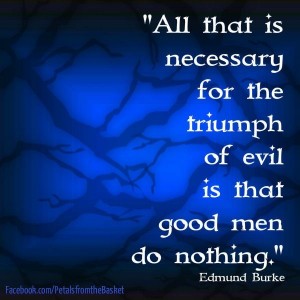 Although this quotation is generally attributed to Edmund Burke, it is found nowhere in his notes. However, many things from the 1700s seem to have disappeared, so maybe that’s why no one has found it! But, that’s beside the point…!
Although this quotation is generally attributed to Edmund Burke, it is found nowhere in his notes. However, many things from the 1700s seem to have disappeared, so maybe that’s why no one has found it! But, that’s beside the point…!
When I read this quotation yesterday, I couldn’t help but be a little divided in my reaction to it. Please bear with me through this entire post. I’ve promised to be transparent, so transparent I shall be—but please don’t choose your answer to the title’s question until you’ve read the entire post.
I like the principle behind this quotation. It implies integrity, involvement, intentional choices, and probably a whole bunch of other things that start with the letter “i.” After all, in the United States, one of our greatest privileges is our right to vote—a means of doing something. We have seen over and over again that when citizens fail to speak up with their votes, evil triumphs, and this can happen in any segment of the government and in any region—or even nationally.
Don’t panic. This is not a political post—you know that’s not my style! However, that scenario paints the picture that would most clearly replicate the thought that comes to mind when reading this familiar quotation. It can be applied to many areas: from schoolyard bullying to international wars; from backyard spats to the overthrow of corrupt governments. Because of this, people often use this quotation and the principles behind it to loudly proclaim the evils of individuals, organizations, or government as a whole.
However (and this is the part that first divided my thinking on this), there is also a time when silence is the loudest weapon you can have and the strongest action you can take. You have heard me share my parents’ all-too-often-needed reminder to me that “silence can never be misquoted.” Yes, it can be misunderstood, and it can be misinterpreted. But it is important to note that the silence element is the only part that you are responsible for. The misquoting, misunderstanding, and misinterpreting—all of which often lead to misrepresenting!—fall back on the other party. You do not give account for their actions—only your own.
Jesus, the One Whose life we wish to emulate, “opened not His mouth” when evil seemed to be triumphant: the crowds were mocking him, and Roman soldiers were beating Him. Wow! That wasn’t weakness at all! That took tremendous courage, grace, and strength!
Yet, this same Jesus boldly taught against sin and spoke out against evil. His very life on earth was lived so that evil will not be triumphant in the end! (I hope your computer screen just heard a “hallelujah” out of you!)
So, which is it—silence or speaking up? As I re-read the quotation of wisdom from Edmund Burke and think about the example of Jesus Christ, I believe that the correct answer is: both. Knowing when to use which one becomes a matter of choice based on motivation, circumstance, timing, location, cause, etc. The bottom line is that what I say—either through my words or through my silence—must always be used in order to impact others in away that allows good to triumph!
Suggested reading: Psalm 19:14; Isaiah 53; James 3; Philippians 2
———–
For those participating in the WRW Month contest, today and tomorrow are BONUS DAYS! Point totals for February 20 and 21 will be DOUBLED!
________________
Thank you for reading “To Be Silent or To Speak Up?” Without sharing names or identifiable situations, feel free to leave a comment answering the question: how can you implement this quotation today?

The skill of speaking bold words at the appropriate time belongs to very few people – most of us do better to heed Proverbs warnings that “he who restrains his lips is wise” (Prov. 10:19). Only our Lord could do both perfectly.
Good thoughts. I’m doing a bit of clean up this week trying to repair some damage that I may have caused by opening my mouth in a hasty and selfish way last Sunday. I need to work on the being silent aspect a bit more. Thanks for the post.